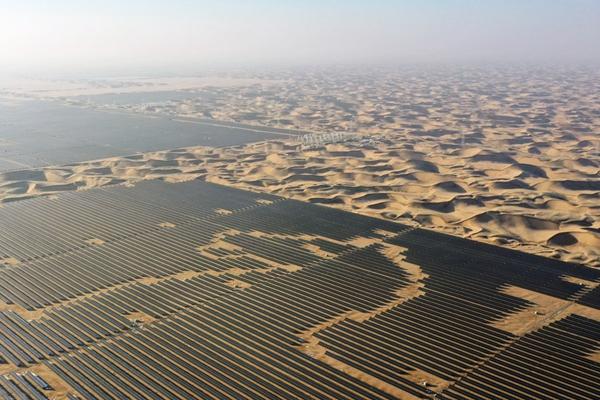

This aerial photo taken on Feb 18, 2023 shows a photovoltaic (PV) power project in Liangzhou district of Wuwei, Northwest China's Gansu
province. [Photo/Xinhua]
As a world leader in renewable energy development, China can help nations in the Global South realize the United Nations' sustainable development goal of achieving energy access for all, a UN official said.
Damilola Ogunbiyi, special representative of the UN secretary-general for Sustainable Energy for All, made the remark in an interview with China Daily after the third Belt and Road Forum for International Cooperation, which was held in Beijing from Oct. 17 to 18.
Sustainable Energy for All is an international organization that works in partnership with the UN and leaders in governments, the private sector, financial institutions and civil society. It aims to support governments with evidence-driven approaches to energy transition and investment strategies that provide decarbonization opportunities.
Ogunbiyi said there is a "disparity" between Asia and Africa in their progress toward achieving Sustainable Development Goal 7, which calls for access to "affordable, reliable, sustainable and modern energy for all" by 2030.
The latest SDG 7 report shows that Asia is making better progress in achieving the goal than Africa. Asia is estimated to have about 69 million people without access to electricity, but in Africa, that number is over 500 million, she said.
There is "a big push" for renewable energy in Asia, and countries such as China and India are making concerted efforts to generate hundreds of gigawatts of green energy every year, Ogunbiyi said. "It makes us really look at Asia as an example of pushing the renewable frontier."
Lauding China's achievements in renewable energy development, Ogunbiyi said that China, with its expertise, can support other developing nations in their energy transition.
"China dominates the market when it comes to renewable energy. I believe over 50 percent of all solar panels, wind (power) equipment, and inverted lithium batteries are made in China," she said, adding that growth of China's manufacturing sector holds the key.
Without access to proper equipment, it is "very hard" to generate renewable energy. "What we're basically trying to do is borrow expertise from China ... and see how we can apply it in other parts of the world," she said.
Ogunbiyi said that some of China's practices can serve as examples for other developing countries. "First, you have to look at your policy and regulatory framework. You have to make sure your framework is inclusive and allows for manufacturing and development," she said. "Then, you have to look at what level of investment you need. And sometimes, you might have to use a part of your GDP and your revenue to develop the sector."
The UN official emphasized the importance of China's capacity building in renewable energy development, saying that the country is primed to provide capacity building and regulatory support to other nations based on what it has already achieved.
"We think it's really, really critical and it will really change the landscape for developing countries if you … show them how to do it and how to develop their own renewable manufacturing industry," she said.
With progress already seen in Sino-African cooperation on green energy, Ogunbiyi said she looks forward to more collaboration between China and African nations. "We are familiar with a lot of large infrastructure (projects) being done by Chinese companies (in Africa), so moving forward to renewable energy development just seems like a natural step."
Currently, there's more demand than supply of solar energy products, indicating that China can play an even bigger role in pushing global solar energy development. "There will always be a role and a place for Chinese products and Chinese (solar) panels ... as we move toward net zero," she said, adding that it is a shared goal.
On the signing of cooperation agreements on renewable energy development at the BRI forum, Ogunbiyi said she was excited about the turnout of "so many emerging economies that see China as a strong partner moving forward as they develop their green future".
